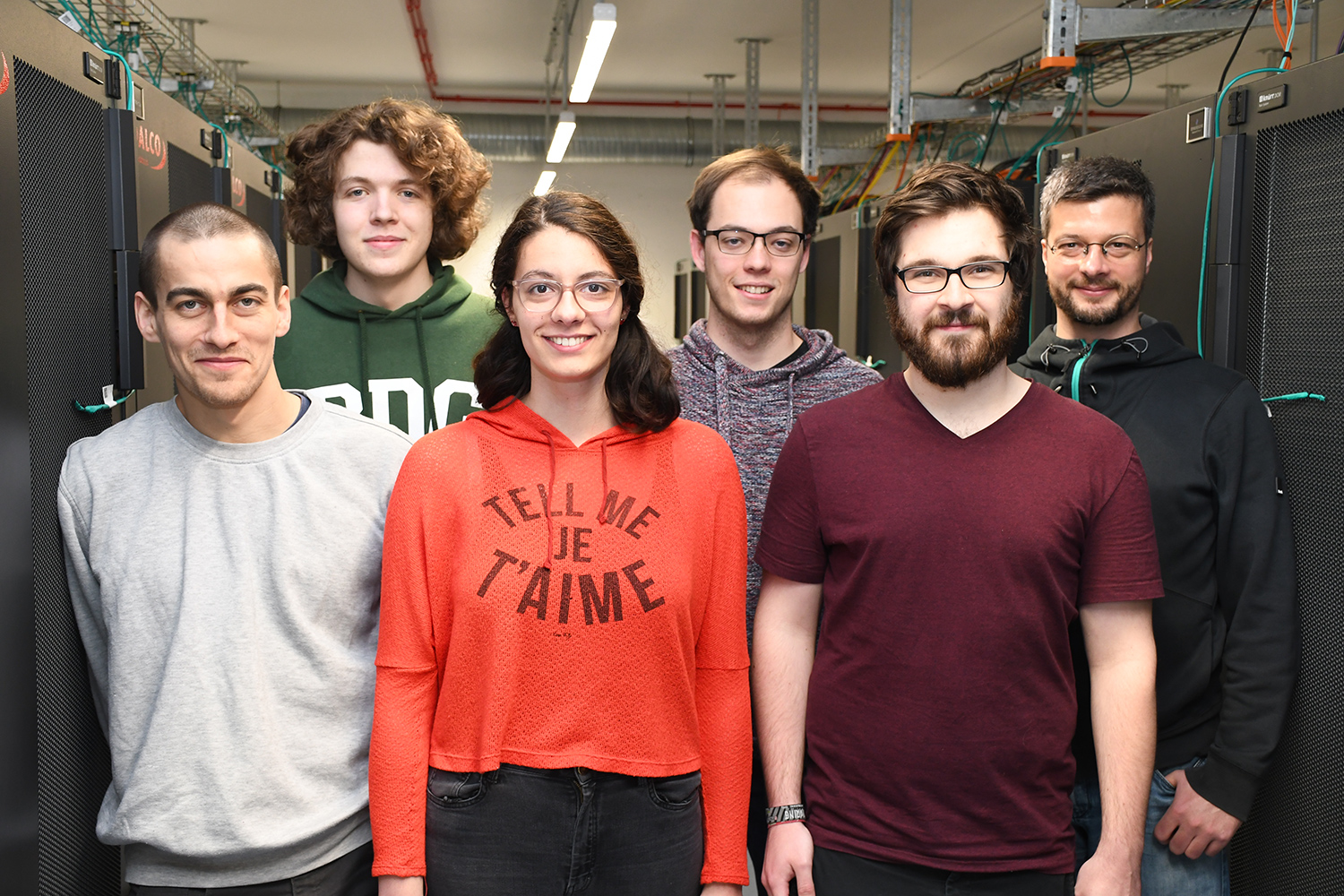PRESS RELEASES
GCS Supports German University Teams in ISC19 Student Cluster Competition
Press Release 03/2019 –
Berlin/Germany, May 21, 2019 – The Gauss Centre for Supercomputing (GCS) proudly announces that it is sponsoring the two German student teams participating in the Student Cluster Competition (SCC) at the upcoming International Supercomputing Conference (ISC19). The conference, held in Frankfurt am Main, runs June 16-20, 2019. The teams, representing the University of Hamburg (UHH) and Heidelberg University (HDU), are among the 14 student teams from Asia, North America, Africa, and Europe accepted for this year’s high-performance computing (HPC) contest taking place on the ISC show floor.
The SCC, held at both the ISC and the SC supercomputing conferences every year, is an international contest for students from a variety of disciplines and backgrounds to test their HPC skills in real time. The fast-paced, three-day competition requires the student teams to build their own clusters and run a variety of applications and benchmarks. Along the way, teams are exposed to different scenarios, such as an unannounced power outage or pop quizzes to test their HPC knowledge. The teams are judged on application performance and accuracy as well as their systems’ energy efficiency.
It is GCS’ fifth year as sponsor of university teams participating in SCCs. By doing so, GCS works to provide German educational institutions additional support in their endeavours to foster young, enthusiastic, talented students’ interest in HPC. GCS supports the SCC teams financially, helping cover the travel costs. Additionally, GCS HPC experts provided technical guidance and support to the students throughout the course of preparing for the upcoming competition.
The University of Hamburg has been represented at SCC events for a number of years and has lately taken additional measures to draw young talent to HPC. At UHH, all students actively participating in the preparation phase of SCC receive ECTS credit points for their contribution and can integrate the Student Cluster Competition as a normal course into their studies. “The Scientific Computing Group of the University of Hamburg has established the SCC and its preparation phase as a recurring course to introduce even more students to HPC,“ explains Michael Kuhn, coach of the Hamburg student team, who sees these efforts bearing fruit. A postdoctoral researcher at UHH, he has offered several HPC related courses in the past and, among other roles, is in charge of the exercises for the group’s lecture “High-Performance Computing”, which is currently attended by more than 50 students. “We believe that our team is well-positioned to have a strong showing at this year’s contest at ISC,” concludes Kuhn.
Aksel Alpay, coach of the student team representing Heidelberg University and academic employee at HDU’s “Future IT—Research and Education” group, also feels confident about his team’s chances. Last year, team HDU—then a newcomer to the ISC student challenge—performed as the highest placing European participant in the contest. Alpay, then a team member himself, is confident that this year’s team will surpass last year’s result. “We count on the extensive knowledge the team members gain throughout the course of preparing for the competition,” Alpay says. “We have an inherently ambitious and motivated group, and on top of that we have two team members who performed in last year’s team. We know what to expect.” While HDU does not offer a formal course dedicated to preparing for student cluster competitions, students can apply to have their participation in this program count as their mandatory practicum requirement.
Regardless of the ultimate outcome at ISC19, both coaches—as well as GCS management—feel confident that the students can only benefit from joining an international competition. “Participating in this fast-paced, tough challenge will give the students an invaluable opportunity to work on real-world HPC challenges. Additionally, it will be an inspiration boost which, hopefully, will fuel their motivations to pursue a career in the field of HPC,” says Dr. Claus Axel Müller, managing director of GCS. “We wish both teams lots of success, luck, and great fun at this year’s contest.”
More Information about the SCC at ISC19 can be found here.

The SCC team representing the University of Hamburg features computer science and software system development students. From left to right: Maximilian Wendt, Michael Kuhn (Coach), Maximilian Bauregger, Hauke Sommerfeld, Fabian Meier, Benedikt Ostendorf, Jannek Squar (CoCoach), Hussam Almotlak, and Matz Radloff. Copyright: University of Hamburg

The SCC team of Heidelberg University at ISC19 comprises of students from the fields of Appplied Computer Science, Physics, Geoscience and mathematics. From left to right: Hernan Campos, Bálint Soproni, Susanne de Vasconcelos Barros Malheiros, Fabian Jäger, Till Bungert, and Falk Löwner. Copyright: Heidelberg University
About GCS: The Gauss Centre for Supercomputing (GCS) combines the three German national supercomputing centres HLRS (High Performance Computing Center Stuttgart), JSC (Jülich Supercomputing Centre), and LRZ (Leibniz Supercomputing Centre, Garching near Munich) into Germany’s integrated Tier-0 supercomputing institution. Together, the three centres provide the largest, most powerful supercomputing infrastructure in all of Europe to serve a wide range of academic and industrial research activities in various disciplines. They also provide top-tier training and education for the national as well as the European High Performance Computing (HPC) community. GCS is the German member of PRACE (Partnership for Advanced Computing in Europe), an international non-profit association consisting of 24 member countries, whose representative organizations create a pan-European supercomputing infrastructure, providing access to computing and data management resources and services for large-scale scientific and engineering applications at the highest performance level.
GCS is jointly funded by the German Federal Ministry of Education and Research and the federal states of Baden-Württemberg, Bavaria, and North Rhine-Westphalia. It is headquartered in Berlin, Germany. For more information, please visit www.gauss-centre.eu.
Contact:
Regina Weigand, GCS Public Relations
+49 711 685-87261
r.weigand@gauss-centre.eu
This press release as a pdf file.